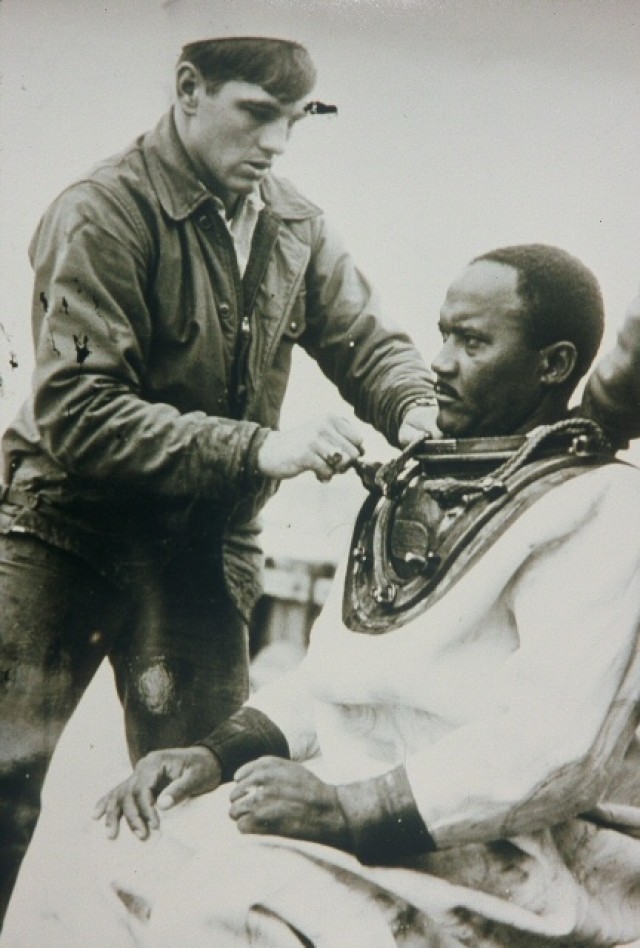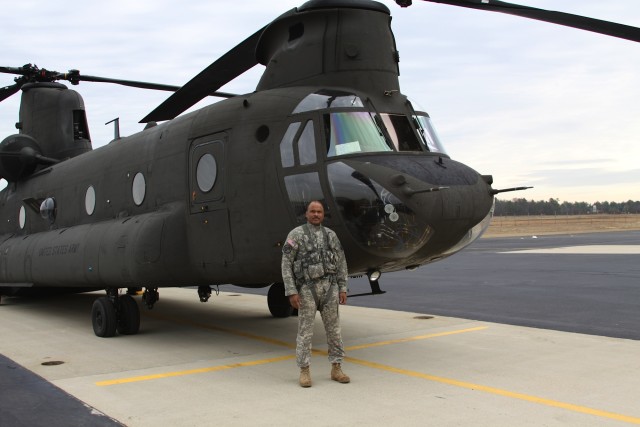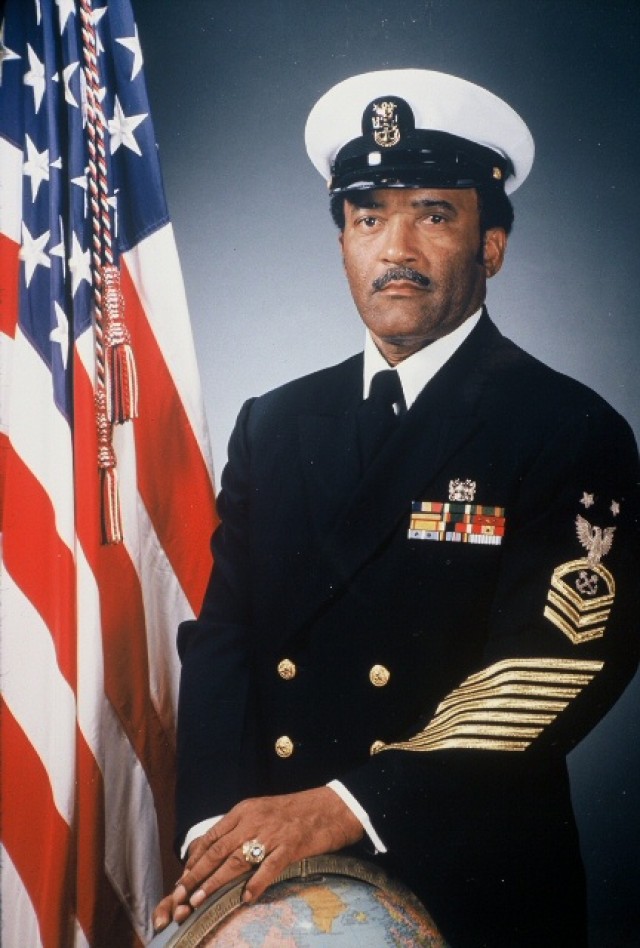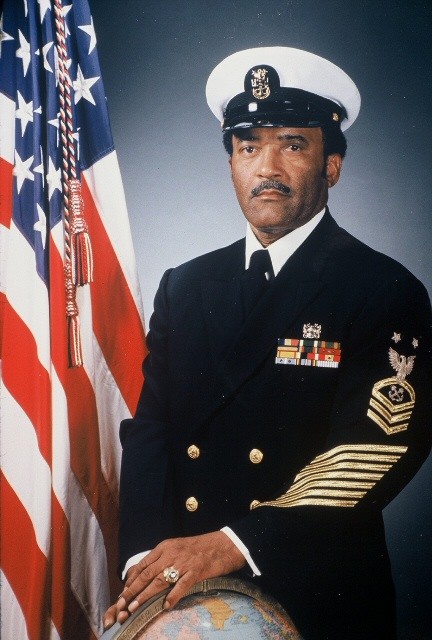1/25/2011 - FORT EUSTIS, Va. -- The tall Soldier sat upright in a maroon office chair, his eyes moistened as he recalled memories of his father, a trailblazing hero Sailor in the U.S. Navy. His Army Combat Uniform appeared orderly, neat and well-fitted, and his voice, while calm, resonated with fond pride.
The nametape over his right breast read "Brashear."
This Soldier was Chief Warrant Officer Phillip Brashear, a U.S. Army Reserve Chinook pilot with Company B, 5/159th Aviation Regiment and son of the late Carl Brashear, the first African-American U.S. Navy Diver, whose triumphant tale was portrayed on the silver screen in the 2000 film "Men of Honor."
Carl Brashear enlisted in the Navy in 1948, shortly after the Navy had desegregated. In the face of widespread racial discrimination, Brashear graduated from the U.S. Navy Diving & Salvage School in 1954, becoming the first African-American to do so.
In 1966, while serving aboard the USS Hoist, Brashear was severely injured while diving in search of a B28 nuclear bomb dropped from an Air Force B-52 Stratofortress following a collision with a KC-135 Stratotanker during in-flight refueling off the coast of Palomares, Spain. The incident resulted in the amputation of his left leg below the knee. Following two years of recovery and rehabilitation, the determined Brashear achieved recertification as a diver, eventually becoming the first African-American master diver in 1970. He retired from the Navy in 1979 as a master chief petty officer.
Inspired by his father's milestone achievements, Chief Brashear enlisted in the Naval Reserve in September 1981, where he began a career in aviation as a jet mechanic.
"My father inspired me to join the military, but never pushed me into it," he said. "I watched my dad's career unfold and wanted to be like him."
Following a transfer to a helicopter unit, Chief Brashear watched enlisted crewmembers serve aboard aircraft, something he had dreamed of since childhood. While serving on helicopters was a great accomplishment, it was flying the aircraft that he truly wanted to do. Without a college degree, Chief Brashear was not eligible for Navy pilot training.
However, he was not deterred from his goal, and applied to the Army's warrant officer program in 1989 with hopes of one day becoming a pilot. He was accepted and graduated from Army Flight School in 1991 as a helicopter pilot in the Virginia Army National Guard. He attributed his perseverance to his father.
"My dad didn't give up, and I wasn't going to give up," he said. "I've got that spirit of resiliency from my dad. What's in my dad is in me too."
Indeed, Carl Brashear's resiliency opened doors and blazed trails for generations of servicemembers to come. Not only did the elder Brashear break down racial barriers, he overcame socio-economic hardships, the son of poor sharecroppers in Kentucky. He also paved the way for handicapped servicemembers to continue serving in his return to service following his amputation, demonstrating that physical limitations do not necessarily inhibit the ability to serve, Chief Brashear said.
"When I was growing up, my dad was no different than any other dad. He played sports with us, boxed, worked out, ran, everything," he said. "He did everything everyone else could do, sometimes better. Looking back, that was the essence of what my father did for society in the legacy he left."
His father's storied determination did not end with his military career. Following retirement, Carl Brashear developed alcoholism while working as a civilian employee at Naval Station Norfolk in Norfolk, Va. Much like his past setbacks, he sought treatment and overcame the disease.
"People from all walks of life can be inspired, not just black people. The uneducated, the poor, the handicapped, people dealing with drugs and alcohol can all use my father's stories as proof that they can rise above and beat all that, as he did before them," he said.
It was these same stories of strength that pulled Chief Brashear from the depths of depression following a tour in Iraq in 2007. During the deployment, his father passed away, leaving him with an emotional void while also struggling with the horrors of war.
After he returned to the United States, Chief Brashear retired from the Army National Guard and accepted a civilian position with the Defense Logistics Agency in Richmond, much like his father did following his retirement.
However, it was not long before the power of his father's legendary will embodied itself in Chief Brashear. While looking through his father's photos and regalia, he returned to the cockpit with the Army Reserve's 5/159 Avn. Regt. at Fort Eustis as a Chinook pilot.
"I came home one day and was looking at my dad's memorabilia and it struck me. My dad never quit, so why would I' My tour in Iraq was tough and when my dad died halfway through it, I was depressed and decided to give it all up. It took a year, but I knew my dad would want me to keep doing what I loved and made the call," he said, fighting back tears.
Chief Brashear and his wife Sandra raised three daughters, Tia, Megan and Melanie, and are currently raising their 10-year-old son Tyler in Sandston, Va. He said his goal in raising his family was to instill in his children the same spirit and determination his father gave to him.
"I want to be the example to my children that my dad was to me. The 'Brashear' name carries a proud heritage with it, something I want my children to treasure and continue," he said. "I do my best to bring honor to that great name, and the even greater man that gave it to me."
Ultimately, Chief Brashear said he wants his father's struggles and accomplishments to inspire positive change in the lives of today's young African-Americans. Rather than perpetuate ideas of disenfranchisement and discrimination, he encouraged them to step up, work hard and bring a struggling economy back to prominence.
"I always hear young black people talking about 'the man is holding me down' and 'the man doesn't want me to succeed.' 'The man' isn't holding anybody back, 'the man' eventually has to retire. Every person that can afford to have a job should do so," he said, impassioned. "Whatever ideas people have about being disenfranchised aren't true.
"It's so easy for someone to tell you 'no,' but It takes effort for someone to show you the right way and say 'yes,'" he continued. "Never take 'no' for an answer if you believe in your heart you can do something, and if my father were here today he would say the same thing."






Social Sharing